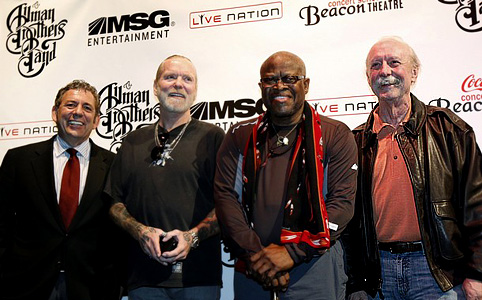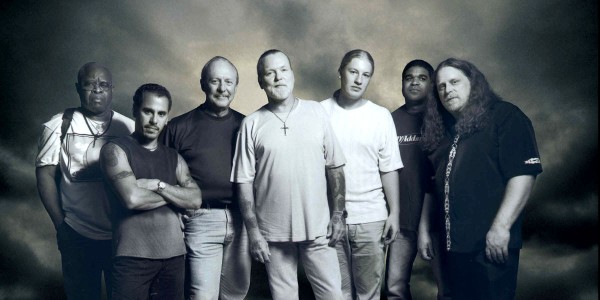The Best Damn Band in the Land
An Interview with Butch Trucks of The Allman Brothers Band
Words by Martin Halo — Palm Beach, Florida
Palm Beach, Florida — The warm Gulf air, blowing off the Florida Keys, rustles the shaggy white hair of Allman Brothers percussionist and founding member Butch Trucks. The 63-year old musician is counting the hours before he escapes the upscale communities of starchy wealth. “I am doing everything I can to get the hell of here”, Trucks proclaims. “Rush Limbaugh, the Koch Brothers and all these people who are the top 1% running the country live here. If that isn’t enough for ya I don’t know what is. If I don’t leave I am going to get myself into trouble!”
Preparing to make his way to New York City, Butch Trucks reflects on the career, impact and legacy of the Allman Brothers Band, immortalized to audiences by the legendary Fillmore East recordings of 1971.
Bred from the pulpit of the southern Baptist church, Trucks’ entire life was filled with music. “My parents were Southern Baptist and they took me to church every time the doors were open. I’m a card carrying atheist now but from a real young age I was part of the church choir. The musical director heard this big soprano voice and stuck me up front to sing ‘I Believe’ to a weeping congregation.”
As the 1960s sparked a cultural revolution, a great migration of southern musicians began to flee to New York or Los Angeles. Trucks remained in Georgia alongside brothers Gregg and Duane Allman. “It was Duane Allman’s band”, reflects Trucks. “He was all about the music and that was all. All of us were in groups where we tried to write hits and it sucked. One day Duane walked in and said, ‘screw this, let’s play music.’ That is why we were all here, not because we wanted to be successful.”
“Everybody at Atlantic Records during that time thought we were crazy,” he continues. “They wanted us to get the blonde kid out from behind the organ, put him up front, stick a salami down his pants and maybe then we would have a chance! We just said, ‘fuck you, we don’t care’. We were playing because it made us feel good”, recounts Trucks.
www.allmanbrothersband.com
“The real tragedy about the Allman Brothers Band was that we really didn’t become incredibly successful until after Duane died. When I listen to our albums up through Eat A Peach [1972], there was a purity there. Duane was no longer around when Brothers and Sisters [1973] was recorded. We started to get into the country stuff and moved away from the jazz. We became successful. All of a sudden the fame, the money, and the groupies became more important than the music. I’ll never forget it. Bill Graham wrote a book and he said, ‘the first time I saw the Allman Brothers pull up to Madison Square Garden all in separate limousines I knew they lost what made them special’. He was right”, admits Trucks. “It is only in the past few years that we have gotten it back.”
Fueled by the catalyst of Derek Trucks’ [guitar] inclusion in 2000, artistic drive, rather than financial intoxication, now steers the Allman’s musical motivations. Alongside Warren Haynes, the voice of Duane’s slide now lives through Derek with the embodiment of a raw mix of funk, blues and sophisticated Raga.
“If Derek [Trucks] isn’t the best guitarist in the world right now, he is by far the most original”, Butch Trucks says of his little nephew. “Even after 10 years, I am hearing something new. I have never worked with somebody that. Still after all this time, you still don’t have a clue what will come next. A prodigy is a kid that can play a bunch of notes really fast, but there is no real feel to it. Feeling and emotion in music comes with life and experience. When Derek was 14 we were recording Seven Turns [1990] in Miami. I took Warren [Haynes] and Gregg [Allman] to see him play in a club in South Beach and it was incredible how a kid that age could take one note and hold it, and hold it, and hold it.”
As the story goes Gregg Allman and Warren Haynes were so blown away at what they saw in that tiny club they waited for the youngster as he stepped out of the spotlight. Looking up into the eyes of the famed musicians and his personal idols, Derek Trucks began rattling off Allman Brothers numbers he wanted to play when he returned to the stage. The three veteran musicians looked at each other in amazement.
“The guitar was bigger than we was”, continues Butch Trucks. “We got up on stage with him and during a 12-bar blues progression there was Derek holding this note for 3 full progressions. He was bending it and bending it. By the time he turned loose the walls were ready to blow off the place. 14 year-old kids are not supposed to know how to do that. Hell, most grown men haven’t learned that. Derek understands it is not about how fast you play, but like Miles Davis said, ‘knowing when not to play’.”

 “We were playing large venues that entire year, and we had enough of it. When you are playing to a crowd of 15,000-20,000 the whole vibe is different. You feel like you have to play the hits, and force a show. But at the Beacon Theatre there is no yesterday and no tomorrow. You are right there; and I have those moments more consistently over the years at the Beacon than any other place.”
“We were playing large venues that entire year, and we had enough of it. When you are playing to a crowd of 15,000-20,000 the whole vibe is different. You feel like you have to play the hits, and force a show. But at the Beacon Theatre there is no yesterday and no tomorrow. You are right there; and I have those moments more consistently over the years at the Beacon than any other place.”
– Butch Trucks on the Beacon Theatre

The official inclusion of Derek Trucks in the Allman Brothers Band in 2000 marked a new era of live exploration that grabbed the influences of John Coltrane, Charlie Parker and Herbie Handcock. The jazz had returned and no case was made clearer than on the stage of New York’s Beacon Theatre.
“New York has always been a huge market for us”, says Trucks, “dating back to the Fillmore East, which was where we broke out. We were the house band there and eventually closed it. Bill Graham got up the last night and said, ‘and now we close with the best of them all’, he recounts with a classic southern drawl. “I’ll never forget it.”
“When we got back together in ’89 we had the option of doing a couple nights at Madison Square Garden or finding something more along the lines of the Fillmore East. We were playing large venues that entire year, and we had enough of it. When you are playing to a crowd of 15,000-20,000 the whole vibe is different. You feel like you have to play the hits, and force a show. But at the Beacon Theatre there is no yesterday and no tomorrow. You are right there; and I have those moments more consistently over the years at the Beacon than any other place.”
After 20 years of The Allman Brothers’ spring awakening in New York City, the band celebrated their 40th Anniversary in 2009 with hi-profile specials guest every night to honor the legacy of Duane Allman. The list included Taj Mahal, two-nights with Eric Clapton, Chris Robinson, Phish, Robert Randolph, Lenny White, Stanley Clarke and everyone in-between.
The epic string of 15 dates would not be followed up in 2010 as MSG Entertainment evicted the Allman Brothers Band from their spring home in favor of a production by Cirque De Soleil entitled Banana Shpeel. To add insult to injury, the production opened two months late and then closed a short time later after receiving less than flattering reviews. The NY Post, as well as cast members from the $10 million dollar production, described it as a ‘train wreck’, ‘catastrophe’, ‘nightmare’,and not to be the understated ‘one of the worst shows you have ever seen!’
When the Allman Brothers found out from management that the Beacon Theatre would not be their New York home in 2010, the reaction was swift and unanimous. “Those mother fuckers!”, exclaimed Trucks with laughter. “That was the reaction and that still is the reaction. Jim Dolan,” the head of MSG Entertainment and owner of the Knicks, held a press conference and came out personally. He apologized to us profusely saying, ‘it was a mistake, we know it was a mistake, we kind of thought it was a mistake at the time, and I would happily suck your dick right now if you would PLEASE come back! It is yours from now on if you would like”, relays Trucks in a comical depiction of the genuine sincerity from MSG’s Chairman.
“Actually, when we stop and think, it probably was a good thing in the long run. That ’09 run was going to be difficult to follow up and now that everyone has forgotten about it, we are again back at the Beacon.”
But even if you are not in New York and can’t make the March run, Butch Trucks has got you covered. In 2009, Trucks launched an internet based concert venture, Moogis.com, where fans can stream the entire Beacon run live, as well as the Wanee Music Festival in their entirely from the comfort of their living rooms.
“The first time Moogis ever went live was for the ’09 Beacon run and if nothing else ever comes out of the venture, the fact that we documented that made it worthwhile. We stream LIVE with Moogis, so if you can’t make it there and want you feel like you are: then take your HDMI cable and hook your wide-screen TV up to your computer. Invite all of your friends over, get in a real tight group, spill beer all over each other and light up a joint so you have the correct smell. It’s just like you are with us at the Beacon!”
“The whole thing started out as an indie record label aimed at jam bands,” he explains. “My whole concept for Moogis was for the first time to create a record label that didn’t screw over everybody that worked for them. I have worked with every damn label there is and there is no doubt about it – record labels make the mafia look like kindergartners”, says Trucks. “That is a fact, and you can quote me there. We have been keeping the lawyers very rich over the years and now we are fighting them over iTunes sales.”
“We signed a contract a long time ago with the people that own our back catalog, granting us 50% of all licensing revenue generated from our music. Back when we signed, licensing was used for television and things of that nature. But now, with the internet, when you download music on iTunes you are agreeing to a license. The record label wants to give us pennies on the dollar for those downloads and the fact that the internet has effectively rendered the labels impotent is fine by me. They needed to have their balls cut off and now what we need to do is come up with another paradigm. That was the basis for establishing Moogis”, concludes Trucks.
www.allmanbrothersband.com
TheWaster.com | Family
03.09.2011


